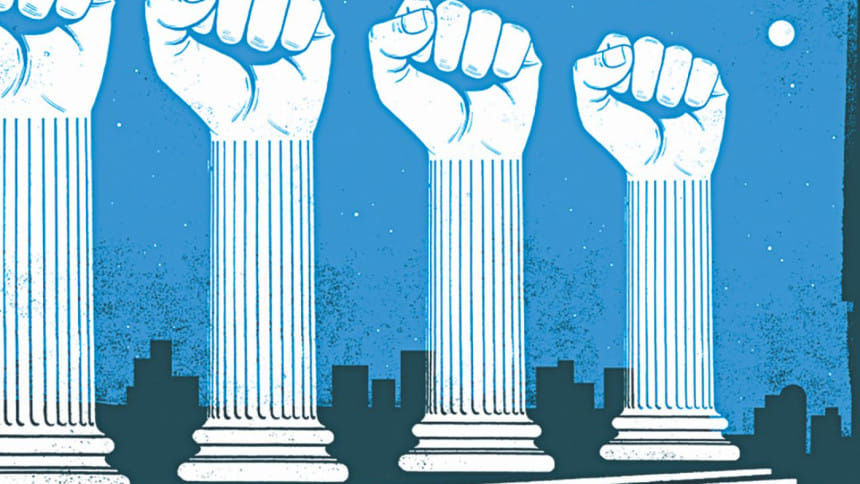Democratic regression: The “English” turn

Gideon Rose made an astute observation in editing the May/June 2018 Foreign Affairs cover story on the current "democratic regression". "We have seen this movie before," he quoted a Latin friend of his on the concurrent predicament, "just never in English." That may be the missing element behind this "regression": populism may be a popular explanation, since it brings to the fore many of the disturbing developments within mature democratic countries; stalled economic growth in these same countries also finds immense currency as a democracy detractor; historically-bent scholars never miss the beat to push the cliché that what goes up (for example, whatever led Francis Fukuyama to proclaim an "end of history" in the early 1990s), must eventually not only come down, but also begin climbing again. And so the story goes.
Yet rarely is the Anglo-Saxon anchor put under the spotlight these days. Even a cursory glance suggests, with a tweak here or a calibration there, democracy may still remain the fairest damsel among governmental types, if, and this is a big if, it is not pitched in a sine qua non mode.
Samuel P Huntington's "wave" explanations get us to centre-stage. His first "wave" did not happen in England and the United States by chance from the early 19th Century, nor could it have soared high enough to be noticed anywhere else, give or take fickle France. How the 16th Century enclosure movement evicted tenant farmers and peasants, privatised the commons, and converted society into a cash-economy playground paved the long and tortuous journey towards the individualism democracy demands. Even then it took the entire 19th Century, not to mention the opening quarter of the 20th Century, to build the one-person, one-vote hallmark democratic feature.
Across the Atlantic a "born-free" country (that is, devoid of vested interests, since they promote parochial over national or global interests), was led down a different pathway. Dominated by only a handful of Anglo-Saxons fleeing monarchical abuses in England during the 17th and 18th centuries, the United States was virtually guaranteed nothing but a democratic future. Yet, this did not come automatically. As in Britain, a liberal market demanded a government from outside the prevalent box. Though the US Constitution enshrined democracy by 1787, the country still had to wait until 1964 before all adults could claim the one-person, one-vote privilege.
Both cases depict an ominously protracted journey to a representative government, demanding voluntarily engagements of its proponents/practitioners in exchange for returning as much more back to that society. This blended perfectly well with private enterprise, but it is the innovative capacity of private enterprise that permits democracy to replenish itself until perpetuity. Only by halting the process, or letting impediments intervene can democracy be disrupted. That, unfortunately, must be what has happened to produce infectious populism. Donald J Trump on yonder side of the Atlantic, and the Brexit vote, not to mention Dutch, French, German, Hungarian, and Italian electoral threats on this, portray today perhaps the sickest face of "English" democracy.
British colonies were expected to spearhead democracy. Frankly and fairly, Britain did whatever it could within its capacities; and that was a lot more than those other European countries boasting empires, whether it be Belgium in the African heartland, France across North Africa and Indo-China, Germany in Africa's south, Italy in Abyssinia, Portugal in Brazil, or Spain across the rest of Latin America. By softening its noblesse oblige imperial approach, "English" democracy had the chance to prevail wherever the British Empire existed were it not for the coincidental emergence of the United States as not only the world leader, but also Cold War participant, after World War II. "English" democracy was hijacked, but only across the friendliest Atlantic waters.
Though still not perfectly democratic by that time (women had only just got the right to vote), the United States continued, for more than a century, to cultivate key institutions (like regular elections, stable parties, and foresighted leadership), just as Britain had done. This is the one area where Rose's Foreign Affairs reference to "English" matters: the inability or unwillingness to permit new-born countries that same time-frame to sow and reap those very fundamental institutions. Britain may not have been behind the global steering-wheel, but in retrospect it can still boast producing one of the finest democracy-in-transition experiments among former colonies: India (even as the world's largest democracy today faces one monumental democratic threat: religious fundamentalism).
If "blaming by default" is a lesser evil than "blaming by deliberation", then the United States must take full responsibility for truncating what it preached: authentic democracy, not one as a tacky alternative to communism, nor as the appropriate outlet for foreign aid and investment. Beginning its world leadership on the wrong foot was enough to prevent fledgling countries from building new institutions upon democratic pillars and principles: instead of promoting the principles of its own Founding Fathers, the United States imposed a sine qua non condition that they reject communism first. A tragedy of errors followed, with dictator opponents of communism (from the Shah of Iran to Ferdinand Marcos, with an Ayub Khan here and Augusto Pinochet there, and gullible tyrants everywhere), quashing their country's maiden democratic flag-bearers (be they Muhammed Mosaddegh, Benigno Simeon "Ninoy" Aquino, Sheikh Mujibur Rahman, or Salvador Allende Gossens). No more fatal a blow could have been inflicted upon democracy and its future than that. No wonder the third and fourth democratic "waves" from the 1980s and late 1990s fell short of delivering: the critical institutions were just not there to absorb the soaring expectations; and it was pathetic to expect them to grow overnight under military command, as in Afghanistan and Iraq, in the 21st Century, as they had done under starkly different circumstances in post-World War II Germany and Japan.
Though this "Third World" or "Fourth World" malaise may not be that far from the heart of the current "democratic regression", which is the Atlantic seaboard, it did feed western populism after the Cold War atmosphere permitted another opportunity for democratisation: their low-waged or import-substitution policy approaches that were encouraged during the Cold War to prevent communist penetration (as across Latin America), now threatened western economies, particularly driving university-educated students into abysmal unemployment.
It may be far too late to turn back the clock (and the policy approaches) to retrieve democracy; but amid the less liberal democracy sprouting, we should be looking where the sun rises to capture the new democratic contours. They will not be picture perfect until they experience their centuries of institution-building trials and errors, as with the "English"; but that might still be a better alternative to the monarchical/dictatorial impulses that gave birth to democracy in the first place several centuries ago.
Dr Imtiaz A Hussain is the head of Global Studies & Governance Program at Independent University, Bangladesh (IUB).

 For all latest news, follow The Daily Star's Google News channel.
For all latest news, follow The Daily Star's Google News channel. 



Comments